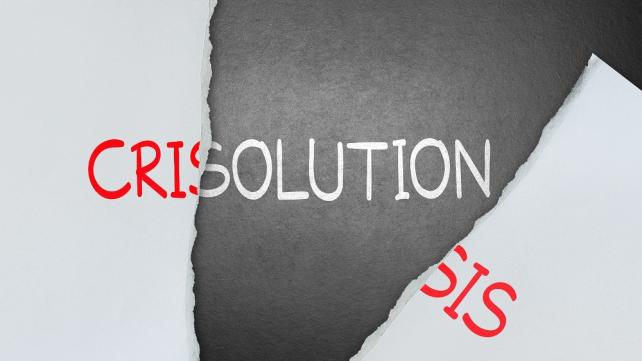Conflict is a part of life. Rarely do we agree with one another on all issues, and rarely are our emotions always regulated and calm. Despite the promises that we may make to ourselves that we will not let life’s stressors get to us, it is very possible for us to experience a conflict that challenges our emotions or reminds us of past traumas. In an extremely stressful situation, we may go from being slightly bothered to angry to enraged. We may be frustrated one moment and desperate the next. Emotions may get charged, and although such occurrences are rare, during a conflict, we may become unable to summon up our natural coping mechanisms.
Children are no different. They, too, may experience intense feelings during a conflict. Usually, our children can work through those feelings and find balance, inshaAllah, with the permission of Allah. There may be other times, however, when parents have to intervene.
Sometimes a conflict, whether within ourselves, our children, or with other people, cannot be resolved easily. We may not be able to reconcile feelings and calm things down. If the conflict involves more than one person or group, the parties involved may refuse to compromise their positions. They may need a mediator, arbitrator, or counselor to step in and help them find common ground. There are other times, however, when a resolution to the conflict is not immediately apparent, and the conflict escalates to the level of a mental health crisis.
Stages of a Crisis
A mental health crisis can be defined as a time when a person’s feelings and behaviors put them at risk of harming themselves or others. Even if harm is not imminent, the person may become unable to perform self-care or take care of loved ones. He/She may become irrational or refuse to communicate. When the stress is at its most intense, they may threaten harm.
A crisis of this sort may pass through levels. Some crisis intervention specialists cite the following four general levels of crisis:
Pre-Crisis Stage
Associated Action: Prepare
During this stage, the crisis has not yet occurred. This is when training may take place, materials are assembled, and crisis protocols are identified. In addition, this is the stage when we mentally prepare for a potential crisis. Make sure your intention is to help the person in crisis for the pleasure of Allah. It should not be to gain a certain reputation, to expose the person, or to show off.
- Ask Allah to protect you and everyone involved from harm. This includes praying that our conflicts don’t ever rise to the level of crisis.
- Think ahead about some of the possible crisis situations that could occur in your environment. Plan your actions steps ahead of time.
- If you are part of a family or team, determine in advance who will play what role. In the event of a crisis, who is in charge?
- Identify the prayers and reminders that you can share with someone in crisis.
- Compile a list of emergency contact numbers.
- Brush up on basic first-aid and CPR.
- Assemble emergency items and keep them in a safe, but handy place.
Crisis Stage
Associated Action: Assess
Try to determine the following:
- Who is involved or at risk?
- What is the specific threat or crisis?
- Which response strategies should you use?
- Who should be notified?
When assessing the situation, remember that the level or severity of the crisis is not determined by the events that precipitated it, but by how those experiencing the events respond to them.
Response Stage
Associated Action: De-escalate
The goal during this stage is to lessen the threat of harm. This is when emotions may be heightened, so the goal is to calm things down and gain control.
Be fully aware of how quickly and dramatically a situation can change because of our actions. We may mistakenly try to resolve a conflict in ways that may serve to escalate it, even though that is not our intention. The person in crisis is not only listening to your words, but they are also listening to your tone and observing your body language. It is possible to speak in a manner that is too authoritative. Our posture or behavior may appear to be threatening. Try to find a balance between assertive and overly accommodating. It helps when we remember Allah controls our affairs and keep in mind your intention for helping.
If the crisis involves a small child, try speaking to them at their eye level. Don’t raise your voice if it is not necessary. Reassure them that you want to listen and help.
Consider these general reminders:
- Notify any support people or authorities.
- Manage any immediate physical threats.
- Once any immediate physical threat has been managed, try to get the person in crisis to start talking.
- Communicate purposefully. Ask questions. Talking may help the person implement their own coping strategies.
- Use any non-verbal signals that the person may understand.
- Offer options. People like choices. Remind the person in crisis that the most harmful actions are not his or her only choices.
- Find a shared interest to discuss with the person. Strive to gain rapport and connection.
- Use a confident voice and give clear directions.
- When giving directions, speak in statements and polite commands, not questions. Don’t say, “Can you put that down?” They can always say no. Instead, say, “Put that down, please.”
- Highlight and acknowledge any compliance. Always highlight their good behaviors, even if the person is not currently exhibiting them.
- Avoid possible triggers. Triggers are sensory stimuli that can elicit strong and sudden emotional reactions. They are the words, sounds, smells, or images that remind us of a past trauma or emotional crisis. They are called triggers because they can set off a new crisis.
- If feasible, remove the person in crisis from the stimulating environment.
- Help the person relax by encouraging Quran recitation, dhikr, and by breathing with slow, deep breaths.
- Be confident. Think: “With the help of Allaah, I can help this child or person feel better or get them to a safe place, inshaAllah.”
- Resist the urge to physically take control immediately unless there is an immediate risk of harm. Allow the person to calm down on their own if possible.
Although we may expect quick and complete compliance with our directives, the reality is that each situation is different and very sensitive. Stay aware, and be flexible about the strategies you employ. Most importantly, call on Allah for support with patience.
Post-Crisis Stage
Associated Actions: Reassess and Give Thanks
The crisis is over after the person is either calm or restrained. The ideal is that the person is able to communicate in a relatively calm manner and is compliant with directions. What occurs after that will depend on the nature of the crisis. Do authorities need to be notified? What follow-up interventions are needed? Is there a danger of the person having another crisis?
A good rule of thumb is for someone to monitor the person for at least 24 hours after the crisis.
As for the person who has intervened, he/she should ask forgiveness for any shortcomings or errors, and give Allah the praise for any success.
Final Recommendations
There is wisdom in the old adage, “Trust in Allah, but tie your camel.” When we think things out in advance, we tie our camels using the strong ropes of forethought and intentional preparation. Our sincere hope is that we will never have to implement these strategies. Our reality, however, is that conflicts in life occur regularly, and they can escalate dramatically and unexpectedly, especially during stressful, polarizing times.
To prepare for a possible crisis, consider this article to be the blueprint for having your own organic discussion about this issue. Get together with other stakeholders with the objective of developing your own Conflict Resolution Protocols and a Crisis Intervention Plan. Read and discuss the article, and tailor the strategies to fit the people, spaces, and resources in your unique environment. Set assigned roles and set goals.
Whether you are a parent, educator, or member of a work or religious community, strongly encourage the other members of your group to come together to tie your camels, keeping everyone safe and secure.
Candice “Sister Islaah” Abd’al-Rahim reverted to Islam in 1976. She has deep education credentials which include an M.A. in Teaching, a a Certificate of Advanced Studies (Post-Masters) in Administration and Supervision, a B.S. in English, and experiences as a principal (in fact the first hijab public school principal in Maryland!), curriculum and staff developer, mentor, and classroom teacher of grades pre-K through 12. She is a former adjunct professor at Johns Hopkins University’s Graduate School of Education and is a Ph.D. candidate in Islamic Sciences at the International Online University. Islaah’s contributions to the field have earned her honors in the Who’s Who of Distinguished JHU Alumni. She is a wife, daughter, mother, and grandmother and is an active member of several Muslim communities in the Baltimore, Maryland area














